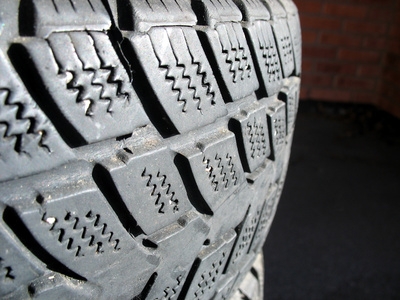
Tires are made of rubber and all rubber products eventually crack. It is just a natural occurrence that is bound to happen over time. It does not mean the tires are useless and must be replaced. Several factors contribute to this process. In some car tires the cracking begins earlier than in others and is more extensive.
Several things cause cracking in car tires, including ultraviolet rays, acid rain, car exhausts, acidic chemicals and heat. Heat and pressure will stretch the tire rubber. So when the tires cool back down and the rubber gathers back together, cracking occurs. When the surface of the rubber breaks down due to environmental factors, this reaction is magnified.
Generally speaking, cracking in car tires is relatively harmless to their overall performance. As long as the tire cracks remain on the surface of the tire and do not extend to the substrate material, the tires are safe to use.
If you look closely at the tires you will see hairline cracks all along the surface. You can identify them with a magnifying glass or by running your hand along the surface of the rubber. Many cracks reveal themselves as the tire rubber is stretched slightly in one direction.
Most cracks are located on the sidewalls of the tires. This portion of the tire actually absorbs a great deal of stress. During turns, when the vehicle weight shifts, the sidewalls stretch considerably. This section of the tire is also thinner than the tread section, as thin as 1/8 inch. However, cracks will penetrate less than a millimeter into the tire rubber in most cases.
If tire cracks become too deep they are cause for concern. Generally speaking, this is only an issue with very old tires, or tires that have excessive exposure to sunlight. Most manufacturer warranties cover tire cracking for up to four years. If you suspect your tires are unsafe it is a good idea to have them professionally inspected by a qualified mechanic.
Tire cracking may be accelerated by other issues pertaining to usage. If a driver drives on a flat tire, this action may cause distortion of the tire rubber which might lead to additional cracking of the rubber. Many people feel that driving on the tires regularly will actually enhance their life because it helps the anti-aging products (which are manufactured into the tire rubber) work more effectively. Over-inflating or under-inflating is also considered one cause of tire rubber cracking.